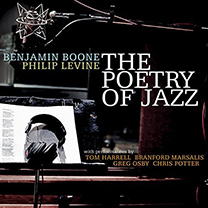May 23, 2018
The Poetry of Jazz - Benjamin Boone & Philip Levine
 Label: Origin Records
Label: Origin Records
Catalog #: ORIGIN 82754
Country: United States
Release Date: March, 2018
Media: cd
There is little point in writing a negative review of a release. Why should anyone expend effort on criticizing the creative efforts of another? In general, one should not. It's a better expenditure of one's time and sanity to praise that which one finds pleasing. Even in this specific instance, it presumably is an unwise venture. For those possessed of greater will-power than ourselves, we encourage you to skip this review altogether.
Every once in a while, something emerges that is so confounding that one is compelled to voice a contrary opinion to the wide ranging accolades. The Poetry of Jazz is an album of thirteen poems read by the late Philip Levine (January 10, 1928-February 14, 2015). Beneath the readings, jazz-themed orchestrations are performed under the direction of Benjamin Boone (1963-), a professor of music who worked with Philip Levine in the years before his death. To be sure, it is a critically acclaimed recording. The official release page has links to numerous glowing reviews from such institutions of the poetry and jazz worlds, including the Paris Review, Downbeat, NPR, Cadence and many others.
The staff of the Poison Pie Publishing House are ostensibly fans of both jazz and the poetry of Philip Levine. We were first exposed to Levine's poetry in the fall semester of 1988. From that time forward, we actively searched out his poetry wherever we could. In our limited travels, we made it a specific point to visit used book stores and libraries in search of poems relegated to long out-of-print volumes. When the internet broadly arrived in the early 1990's one of the first wonders that it presented to us was the emergence of abebooks, an inventory of used book stores across the country, which allowed us to instantly purchase relatively inexpensive copies of every Philip Levine book that had eluded us for years. (Sadly, abebooks, while still an entity, no longer fills a niche for the bibliophile in pursuit of rare books.) At that time, we assembled a webpage to describe his published works, a page which still exists to this day.
The staff of the Poison Pie Publishing House also expresses its interest in jazz through irregular music reviews, archived here. So it seemed natural that The Poetry of Jazz, combining these two loves should appeal to us. The first night that we heard of the release, we immediately purchased a copy and downloaded the tracks while the cd had yet to ship.
Today, on the following morning, to say that we are deeply disappointed is an understatement. Levine's readings, the intonation and rhythm, are just as we remember them from other audio and video recordings of Levine's poetry, as well as from our own attendance at one reading to celebrate the publishing of What Work Is in 1991. It is the accompanying music, which is so distressing. It is a kind of highly produced, highly orchestrated music, largely devoid of improvisation. To call it jazz at all is something of a misnomer, applicable only to the perception of jazz as an ossified museum specimen. Some tracks, which are more lively, call to mind a Vegas act, where washed-up performers go to rehash old songs until their performing careers come to an ignominious close. It seems a kind of antiseptic presentation intended to please an audience of utterly predictable tastes, who demand only to hear that which they have heard before. Other more somber tracks recall a funeral, in which Levine recites his own eulogy, while the band plays on, their cliché riffs echoing in endless repetition. The tempered emotion in the voice of Levine is imbalanced by a saccharine soundtrack. Gruesome!
There are examples where the intersection of creative music and poetry generate a surprising and appealing result. The first that came to mind, while listening to The Poetry of Jazz is Poetry and Playing, in which the English non-idiomatic improvisational guitarist, Derek Bailey (January 29, 1930-December 25, 2005), plays while reading the poetry of Lyn Hejinian, Peter Riley and Steve Dalachinsky. In this recording, improvisation is vitally present in both instrument and voice. While this cd was released on the short-lived Paratactile records (1998-2004), used copies remain available. Another juxtaposition of poetry and creative music that comes to mind involves the English musician, David Sylvian (February 23, 1958-). In Uncommon Deities (Samadhisound, 2012), he recites English translations of ten poems of the Norwegian poet, Paal-Helge Haugen (April 26, 1945-) and one by Norwegian poet, Nils Christian Moe-Repstad (1972-). This album had an extraordinary effect, but was released in insufficient quantities and now sells on the used market at a premium. Sylvian followed this up with There's A Light That Enters Houses With No Other House In Sight (Samadhisound, 2014) with an hour-long track of musical accompaniment to the American poet Franz Wright (March 18, 1953-May 14, 2015) reading his poetry. It is not quite as earth-shaking as Uncommon Deities, but we nevertheless were sufficiently prompted to investigate with repeated listenings.
Having written this review, we feel only a dull regret, knowing as we did before we began, that a negative review serves no purpose. Surely, Benjamin Boone is a good man. He obviously loved the poetry of Philip Levine and created this work to share his appreciation with a broader audience. Kudos to him. We can console ourselves with the certain knowledge that, buoyed by a plethora of positive reviews from highly placed critics, The Poetry of Jazz will suffer no harm from this inconsequential review to the contrary. Perhaps, we felt compelled to offer a counter opinion only to encourage those who found little of interest in The Poetry of Jazz not to give up on the concept, but to continue to look for it in less polished venues.

